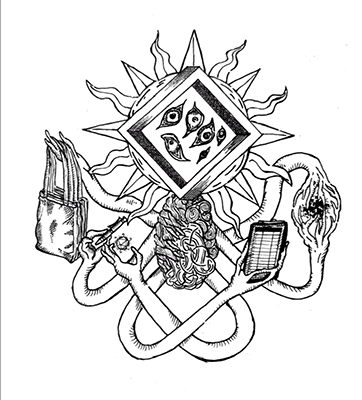Disclaimer: the author of this article is one of Ancient One’s most treasured acolytes and has been promised a place amongst their pantheon when he passes through the veil of mortality and transcends to the ocean of a trillion stars. This association will not impair his ability to discuss the topic of elder gods impartially and accurately.
O-week is a long and hallowed University tradition. But where does it come from? What master does it serve? And most importantly of all, what does it want with the mortal realm?
It is widely agreed upon that the O-Week we know today began sometime in the early 20th century. Exact dates are shaky, owing to the Great USYD Records Fire of 1917. But one thing we are certain of is that this sanitised version of O-Week that we know today is not at all how it began.
In less well respected academic circles, scholars across the country debate the origins of this hallowed week. One theory suggests that O-Week was made to appease the ancient ones. Before planet Earth was even on the cosmos’ to-do-list, the elder gods dwelled in the far reaches of the galaxy. And the elder gods hungered, but not for the traditional fare of cosmic beings (widely considered to be forbidden knowledge, solar systems, or maybe a black hole or two).
The soul eater Kalathoon, a being of indescribable horror but easily described tentacles, lusted after the quickly unravelled desire of students to join in excess of 10 clubs and societies.
The world devourer Halasense desired above all else the indecision and confusion found in a student’s choice between a USU membership and a USU rewards membership.
And worst of all: Sharthenar, the faceless one. It is said that if you listen closely you can hear the cries of a thousand club and society executives, all of them begging for you to join. Of course there are many others, all of whom have equally specific cravings, but I dare not speak their name, lest I incur their cosmic wrath.
To appease these deities, O-Week (or to its victims: OHHHHHHH! week) was founded. Empires across the universe held festivals on university grounds to mark the occasion every year: the collective energy of billions of students satisfying the insatiable hunger of those darker creatures better left unmentioned. This galactic tradition was introduced to Earth and more importantly the University of Sydney when we were colonised by the Fluxan Republic following the close of the Great Moon Wars.
But others dispute this notion. One such person by the name of Dr Keith Ülu, claims to have lit the Great USYD Records Fire of 1917 himself, and further claims that he happened to closely study many of the documents stored there, before he soaked them in lamp oil and set them ablaze.
I met with him earlier this week in his offices, and have provided a heavily edited and inaccurate transcript of our interview.
Interviewer: Thank you for joining me today.
Dr.Ülu: It’s a pleasure to be here and a pleasure to have the opportunity to set the record straight.
Interviewer: The record in question presumably being the one you set alight.
Dr.Ülu: (silence through gritted teeth)
Interviewer: Now Keith, you’ve taken a controversial and frankly maddening
position against the popular elder gods explanation for what I can only describe as
the absurdity of O-Week. What’s your alternative theory?
Dr.Ülu: Well the crux of the issue is that people are so eager to think
O-Week is done in homage to some off world, other-universe, unknown, do nothing
deities. What ever happened to Earthly deities? All I’m saying is that whenever an
unknown phenomenon crops up all the conspiracy nuts go straight to the Ancient
Ones. Underemprayment and even at times unemprayment has risen sharply among terrestrial deities.And the only way we can stop the outsourcing of our mythology to say…some cult in the Andromeda galaxy is to support locally produced, Earth based, or at the very least Milkyway based, deities. People forget that planet Earth has a fair few monstrosities beyond human conception as well.
Dr.Ülu has a point. 90% of fantastical explanations utilise elder gods or, as Dr.Ülu puts it in his book Supporting Local Abstract Entities: How to Theorise Responsibly, “super-universal beings”. But is it so horrible of us Earth dwellers to dabble in a bit of cosmic horror? For all accounts, they’re the perfect scapegoat: imperceivable, indescribable, and most likely residing billions of light years away. Is it time we start thinking of O-Week as a harvest festival for the spring goddess Ostara, or perhaps as a sacrifice to appease the water monster Taniwha, or are we satisfied to allow our planet’s culture to be supplanted by some universal beings who haven’t even visited Earth, let alone know the kind of fear inducing mythology we require. In this reporter’s opinion: why not both?
The Elder Gods were contacted for comment but at the time of this article’s publication they have not responded.





